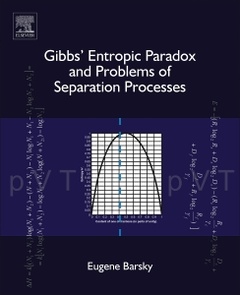Description
Gibbs' Entropic Paradox and Problems of Separation Processes
Author: Barsky Eugene
Language: English
Subject for Gibbs' Entropic Paradox and Problems of Separation Processes:
Keywords
Analysis; Binary and multicomponent separation; Binary multiproduct separation; Biological systems; Boundary conditions; Carnot cycle; Cascade; Composition probability; Correspondence; Distribution coefficient; Dynamic entropy; Efficiency; Entropic efficiency; Entropy jump; Entropy; Equilibrium; Evaluation of complex systems; Fractional extraction; Heat transfer; Imperfection of theory; Informational entropy; Irreversibility; Kinetic theory; Macrostate; Markov chain; Mass process; Matrix; Microstate; Mixture of gases; Nondimensionless; Optimization algorithms; Optimization; Paradox; Physical systems; Probability; Problem solution; Quality criterion; Quantum physics; Ratio; Regular cascade and irregular cascade; Reversibility; Search strategy; Separation; Stability; Static entropy; Statistical physics; Thermal balance; Thermodynamic probability; Thermodynamics; Uncertainty
Support: Print on demand
Description
/li>Contents
/li>Readership
/li>Biography
/li>Comment
/li>
Gibbs' Entropic Paradox and Problems of Separation Processes reviews the so-called Gibb?s Paradox observed during the mixing of two systems. During the last 150 years, many physicists and specialists in thermodynamics, statistical and quantum mechanics been engaged in the solution of the Gibbs paradox. Many books and journal articles have written on this topic, but a widely accepted answer is still lacking. In this book, the author reviews and analyzes all this data. Based on findings, the book formulates a different approach to this paradox and substantiates it on the basis of physical and statistical principles.
The book clearly shows that entropy consists of two parts, static and dynamic. Up to now, entropy has been connected only with the process dynamics. However, the Gibbs paradox is caused by the change in the static component of entropy. Finally, the book includes examples of separation processes and how to optimize them in various fields, including biology, cosmology, crystallography and the social sciences.
1. Peculiarities of Thermodynamic Regularities Formation 2. Brief Review of Thermodynamic Regularities 3. The Gibbs Paradox and Attempts of Its Solution 4. Solution of the Gibbs Paradox and Related Problems 5. Available Quality Criteria for Separation Processes 6. Generalized Optimization Criterion for Separation Processes 7. Multistage Separation Mechanism 8. Practical Application of the Obtained Results 9. Analysis of the Obtained Results and Summing-up
students, doctoral candidates and scientists and specialists in the fields of thermodynamics statistical physics; biology; crystallography; astronomy; all other fields using the entropy parameter; mining engineering; metallurgy; electronics; modern ceramics;
- Provides a precise definition of entropy and allows the formulation of criteria for optimization of separation processes
- Explains the role of entropy in many processes, facilitating an in-depth analysis and understanding of complicated systems and processes
- Provides solutions to scientific and applied problems in various scientific disciplines related to separation processes
- Elucidates entropy’s role in many separation systems

